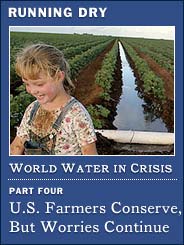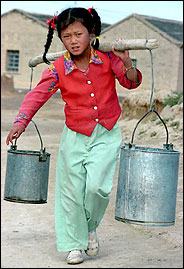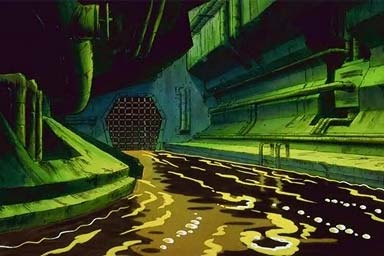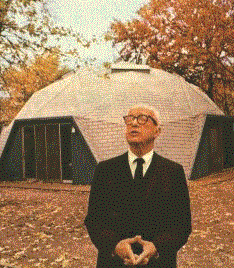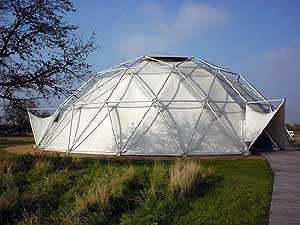|
Flushing America's Most Vital
Resource Down The Toilet GROUND ZERO, New York
City, August 28--There's a Terrorist in every toilet. Just
take a look. You probably can't see it. It's invisible,
but it's there.
And, it's happening now.
One small drop of Water Terrorism drips upon another, and another, slowly,
insidiously, like the al-Qaeda, sneaking up on us in the shadows of our
rush to live today at the expense of tomorrow.
But whatever water is
being saved is being consumed by a growing population. Each new
person adds to the depletion of water. One Texas farmer put it
this way: "We're all drinking from the same glass. Maybe we're
drinking a little less, but the more straws that are stuck in the glass,
the faster the water disappears."
The battle over
water is between the farmers and the cities. As cities expand,
creating "more straws in the drinking glass," the precious resource
necessary to grow food diminishes. While U.S. farmers have the
first claim over water, the cost of it is rising to make farming
uneconomical.
I had my own personal
experience with the precious nature of water years before in Vietnam.
It involved a toilet. Unfortunately, there was
one bathroom. I noted that when I used it, there was no water
in it, and no matter how I pulled on the chain to engage the gravity
filled tank above, nothing happened.
Also, in the late
70's when I was the senior vice president of Century 21 marketing, I
constantly made bets with my associates that I could draw upon the
greatest minds of the world for information. I bet my
associates I could get Buckminster Fuller to come to our company and talk
with us on a personal level.
Our strategies had come
from futuristic thinkers such as Buckminster Fuller, and Alvin Toffler.
I found Mr. Fuller's address and location in Santa Barbara and wrote him a
letter, describing how we had designed our incredible company on his
"futuristic thinking," and invited him to come and visit us so we might
talk about the future.
I leaned forward, a quick
study that the man had an agenda and any question I might ask would only
be curve ball he probably wouldn't swing at. If you didn't need
water, you'd live anywhere. If you didn't need sewage, you'd live where
ever you wanted. It's the pipes that control civilization, a
maze of pipes bringing water in, taking garbage out. It forces us to
live like cattle, all jammed together."
"Mobile
geodesic home modules, with the ability to generate their own water, with
solar panels for heat, and a self-contained septic system--that's the
future, he said. Helicopters fly them anywhere, drop them in a
placid spot next to a stream or trees. You live in
self-contained luxury, away from the madness of the city, away from the
sewage tits that strangle mankind."
"What family would
want to live in a congested city when they could live in the harmony of
nature in their self-contained geodesic dome," he stated. "Who
would want concrete over nature?"
Then I thought about
a toilet. I thought about flushing it as though the flow of the
precious resource would never end. How absurd, I thought, to
think I can take and take and take without one day draining the well.
When I do, I think about
the faucet dripping. I think about the extra flushes of the toilet.
I think about the importance of taking one's family away from the madness
of the city out into the womb of Nature, where a child might chase
butterflies, might romp in the sweet grass of summer, might climb a tree
without worrying about getting a ticket, might be fascinated about the
ability to distill his or her own water, or be warmed by a solar panel
rather than a radiator or an electric blanket. Availability of water (in cubic
meters) per capita
|
| Country |
1955 |
1990 |
2025 |
| Djibouti |
147 |
23 |
9 |
| Kuwait |
808 |
75 |
57 |
| Malta |
96 |
85 |
69 |
| Qatar |
1,427 |
117 |
68 |
| Bahrain |
672 |
179 |
89 |
| Barbados |
221 |
195 |
164 |
| Singapore |
459 |
221 |
181 |
| Saudi Arabia |
1,266 |
306 |
113 |
| United Arab Emirates |
6,195 |
308 |
176 |
| Jordan |
906 |
327 |
121 |
| Yemen |
1,098 |
445 |
152 |
| Israel |
1,229 |
461 |
264 |
| Tunisia |
1,127 |
540 |
324 |
| Cape Verde |
1,184 |
551 |
258 |
| Kenya |
2,087 |
636 |
235 |
| Burundi |
1,339 |
655 |
269 |
| Algeria |
1,770 |
689 |
332 |
| Rwanda |
2,636 |
897 |
306 |
| Malawi |
2,839 |
939 |
361 |
| Somalia |
2,500 |
980 |
363 |
| Libya |
4,105 |
1,017 |
359 |
| Morocco |
2,763 |
1,117 |
590 |
| Egypt |
2,561 |
1,123 |
630 |
| Oman |
4,240 |
1,266 |
410 |
| Cyprus |
1,698 |
1,282 |
996 |
| South Africa |
3,249 |
1,317 |
683 |
| Korea, South |
2,940 |
1,452 |
1,253 |
| Poland |
2,053 |
1,467 |
1,279 |
| Belgium |
1,906 |
1,696 |
1,706 |
| Haiti |
3,136 |
1,696 |
838 |
| Lebanon |
3,088 |
1,818 |
1,113 |
| Peru |
4,612 |
1,856 |
1,071 |
| Comoros |
5,256 |
1,878 |
620 |
| Iran |
6,203 |
2,025 |
816 |
| Mauritius |
3,854 |
2,047 |
1,575 |
| Syria |
6,500 |
2,087 |
732 |
| United Kingdom |
2,344 |
2,090 |
1,992 |
| Ethiopia |
5,073 |
2,207 |
842 |
| Lesotho |
5,039 |
2,290 |
1,057 |
| Zimbabwe |
7,061 |
2,312 |
1,005 |
| China |
4,597 |
2,427 |
1,818 |
| India |
5,277 |
2,464 |
1,496 |
| Sri Lanka |
4,930 |
2,498 |
1,738 |
| Germany |
2,843 |
2,516 |
2,384 |
| Denmark |
2,928 |
2,529 |
2,529 |
| Dominican Rep. |
7,306 |
2,789 |
1,747 |
| Nigeria |
8,304 |
2,838 |
1,078 |
| Spain |
3,801 |
2,849 |
2,733 |
| Tanzania |
8,525 |
2,924 |
1,025 |
| Afghanistan |
5,137 |
3,020 |
1,091 |
| Korea, North |
7,836 |
3,077 |
2,010 |
| Italy |
3,845 |
3,243 |
3,325 |
| France |
4,260 |
3,262 |
3,044 |
| Thailand |
7,865 |
3,274 |
2,477 |
| Cuba |
5,454 |
3,299 |
2,694 |
| Madagascar |
8,476 |
3,331 |
1,185 |
| Togo |
8,485 |
3,398 |
1,280 |
| Jamaica |
5,383 |
3,430 |
2,365 |
| Ghana |
9,204 |
3,529 |
1,395 |
| Turkey |
8,509 |
3,626 |
2,186 |
| El Salvador |
8,583 |
3,674 |
1,952 |
| Uganda |
11,880 |
3,759 |
1,437 |
| Pakistan |
10,590 |
3,962 |
1,803 |
| Mozambique |
8,601 |
4,085 |
1,598 |
| Trinidad and Tobago |
7,073 |
4,126 |
2,867 |
| Mexico |
11,396 |
4,226 |
2,597 |
| Mauritania |
9,855 |
4,387 |
1,778 |
| Japan |
6,091 |
4,428 |
4,306 |
| Senegal |
12,451 |
4,777 |
2,049 |
| Sudan |
11,899 |
4,792 |
1,993 |
| Philippines |
13,507 |
5,173 |
3,072 |
| Benin |
12,316 |
5,625 |
2,105 |
| Vietnam |
11,746 |
5,638 |
3,215 |
| Niger |
16,362 |
5,691 |
2,067 |
| Czechoslovakia |
6,950 |
5,810 |
5,078 |
| Greece |
7,406 |
5,828 |
5,840 |
| Netherlands |
8,371 |
6,023 |
5,093 |
| Iraq |
18,441 |
6,029 |
2,356 |
| Cote d’Ivoire |
22,974 |
6,177 |
1,950 |
| Namibia |
15,900 |
6,254 |
2,399 |
| Lithuania |
9,130 |
6,433 |
5,804 |
| Albania |
15,120 |
6,462 |
4,711 |
| Portugal |
7,665 |
6,688 |
6,519 |
| Mali |
15,853 |
6,729 |
2,522 |
| Chad |
13,389 |
6,843 |
2,944 |
| Switzerland |
10,040 |
7,449 |
6,492 |
| Nepal |
19,596 |
8,686 |
4,244 |
| Romania |
11,895 |
8,963 |
7,918 |
| Swaziland |
23,918 |
9,268 |
4,002 |
| United States |
14,934 |
9,913 |
7,695 |
| Hungary |
11,704 |
10,897 |
11,062 |
| Yugoslavia |
15,126 |
11,130 |
10,161 |
| Estonia |
15,517 |
11,371 |
10,804 |
| Mongolia |
29,413 |
11,416 |
5,454 |
| Austria |
12,955 |
11,670 |
10,892 |
| Zambia |
34,872 |
11,797 |
4,576 |
| Guatemala |
33,810 |
12,613 |
5,354 |
| Latvia |
16,874 |
12,654 |
12,350 |
| Luxembourg |
16,394 |
13,405 |
11,682 |
Poplulation Action International
Go To Aug 27 - To Attack Or Not To Attack?





